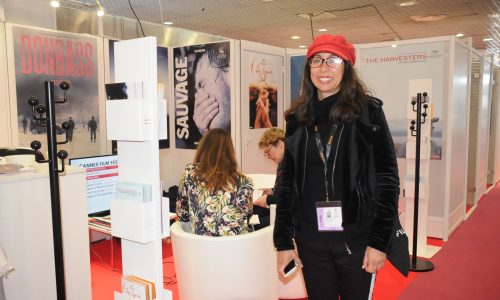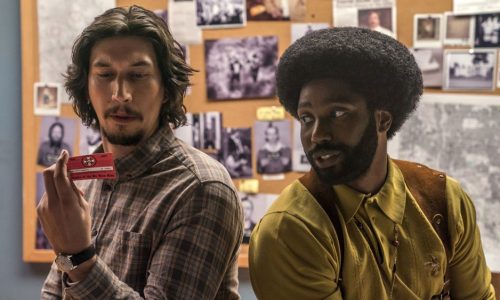Today started with more talk of how to improve inclusion in the UK film industry with an all-woman panel discussion at the UK Film Centre, that included Dr Stacy L Smith, who we met yesterday, as well as the producer of films including Carol, Elizabeth Karlsen, the BFI’s director of inclusion, Jennifer Smith and an American director, Deborah Riley Draper.

Four women – to varying degrees angry and frustrated at the status quo – dug their teeth into a highly complicated debate with a very clear end-goal but few clear and coherent routes to get there. “Ditch the labels” was one of the first phrases to emerge, as part of the argument that women should be able to direct action films, for example, but surely the whole point of the debate is about labeling people in order to help them make progress against the odds? As in yesterday’s discussion, there was an element of ditching the labels by highlighting them.

The BFI’s Jennifer Smith also spoke of the importance of the authenticity of a story, which seemed to contradict Stacy L Smith’s idea of decoupling the director from the content of a film. But the general theme that emerged again and again, articulated by Elizabeth Karlsen, was that the argument needed to be about education, rather than representation, per se. But Dr Smith thinks education isn’t enough. “What do we do when the numbers don’t move and education doesn’t work?” she asks. “Agitation becomes really important,” she concluded, promoting the idea of the “inclusion rider in contracts. “To move the needle, you need collective action.”
Deborah Riley Draper added that the problem starts with the financing. “When a black woman like me walks into the room, they’re thinking ‘Is this going t be a risk?'” This idea of minorities making films being more risky for investors is one of the elements that particular annoys Jennifer Smith. “I hate the association with risk. This should be about being cutting edge.” And she insisted that inclusion improved creativity, rather than stifling it.
Next was a press lunch, laid on by the BFI, to give film journalists a chance to get to know the industry’s administrators…and out of the rain It was particularly interesting to get a different perspective on Brexit from Amanda Nevill, who runs the BFI, as she described how the heads of Europe’s film agencies cooperate.

Having met the producer at a party last week, I thought I’d take the opportunity to see the South African film The Harvesters, which was playing in the Un Certain Regard strand. Cannes Security wasn’t quite as accommodating today as yesterday and the food police were out in force. The rummaged through my bag, pulling out whatever food they could find, including a pain-au-chocolat I’d been looking forward to enjoying on the beach later, and threw them in the bin. I wasn’t standing for that. I ordered them to take the pain-au-chocolat back out of the bin so that I could eat it there and then, at the security point, before going inside. I almost wouldn’t mind but there’s a cloakroom where you an leave bags anyway, so I can’t understand why they don’t let you take your bag – and your food – inside and leave it in the cloakroom. Anyway – the film was a low-budget drama, set in a small regligious Afrikaans-speaking community in South Africa’s Eastern Cape, in which the eldest son in a farming family has his life thrown upside down by the arrival of a new boy, whom he’s expected to treat as a brother. It’s a slow burning family drama that tackles the themes of jealousy, influence and sexual power play and awakens only when the true relationships emerge.

Back in the market, film-makers of all varieties were continuing to pitch and sell their wares. American producer Victoria Cordova’s screenplay Three Nights in Amsterdam was selected for the Trans Atlantic Strategic Partnership International Co-production scheme, which has connected her with producers, sales agents and distributors. She says it’s always worth showing your face in Cannes to catch up with colleagues from around the world.
I left Victoria in the market to head to the next film, only to be accosted once more by the food police. Confident that I should be OK, having previously had half a dozen biscuits stolen by their colleagues, it turned out that they found more, hidden so deep that the previous thieves had missed them. These ones also found and confiscated my deodorant. Come on?! This is not an aeroplane. “That’s the only deodorant I have in the whole of France,” I cried, perhaps a little melodramatically. But it worked. Grudgingly, she put it back in my bag and told me not to bring it tomorrow. I hoped the film would be worth the humiliation and frustration.

It was one of the highest profile competition entries, Spike Lee’s BLACKkKLANSMAN, about a black police officer who infiltrated the Ku Klux Klan in Colorado Springs in the early 1970s. As the opening credit puts it, “dis Spike Lee joint is based on fo real, fo real shit!” It’s an effective and entertaining thriller, with particularly strong performances from John David Washington (Denzel’s son in his first major big screen role) and Adam Driver, who’ll be featuring again in the festival’s closing film, The Man Who Killed Don Quixote. Lee tells an incredible story – in both sense of the word – that mostly rings true and makes some subtle jibes at the current US President, putting many of Donald Trump’s best known campaign phrases into the mouths of the Ku Klux Klan. But he couldn’t control his temper and lets rip at the end of the film. Highlighting – fairly – that decades after this small victory in the larger war against racism, there’s still a big problem in the US, having used the film to make cheeky nods to his perception of the problem (as if racism went away for the eight years of Barrack Obama’s presidency and returned last year), he proceeds to whack you over the head with a frying pan with footage of white supremacists marching at Charlottesville and, predictably, the footage of Donald Trump telling reporters that there were bad people on both sides of the demonstrations. It’s a powerful message – and one that deserves to be heard but it might perhaps have sat more comfortably at the end of last year’s Detroit – and you leave the cinema thinking not about the film you’ve just seen but the problems that exist in the US now – it’s something that Lee obviously wants you to be thinking about, but at the expense of the movie he’s toiled over for so long?
Then, with an invite to the BLACKkKLANSMAN after party, it was back to the apartment to smarten up. The party was, finally, the kind of event that I became used to, attending the Golden Globes and associated events for five years. There was drink on tap, as I’ve seen at many other parties, but rather than finger food – or none at all – there was a proper buffet with a huge range of meat and fish dishes, after which a vast array of desserts were available. Only after this did I notice there was a chef in the corner, grilling fish fillets and cooking pasta to perfection – I had no choice but to have dinner all over again. And you can’t have a nice fish dinner without dessert, can you?
